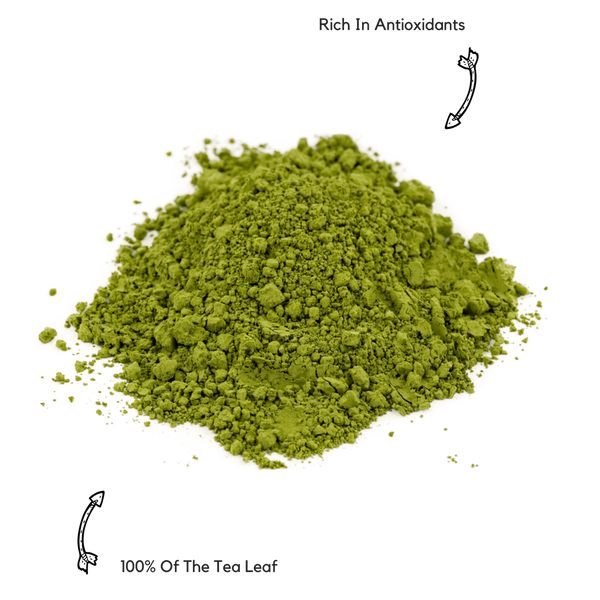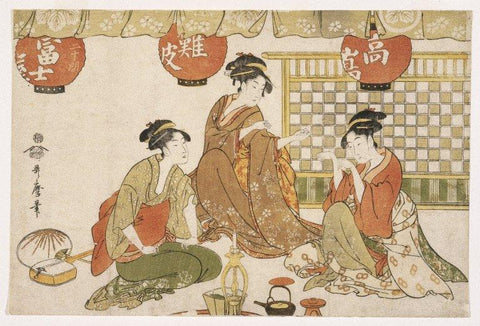New To Matcha?
Matcha is the oldest and most celebrated tea of Japan. While the growing and harvesting process is much more complicated than with other teas the end result is simple; the world's healthiest and most nutrient rich tea. Technically speaking Matcha is made from the same plant all true tea leaves comes from, camellia sinensis. It is the growing and harvesting process that makes Matcha markedly different. With Matcha, the leaves are grown in the shade two weeks prior to harvest resulting in the production of chroylphll, which gives Matcha its distinctive bright green color. The leaves are then stoned ground into a very fine, nutrient dense powder.
As opposed to steeped tea leaves Matcha means consuming 100% of the leaf which is why it has 10x the nutrients of regular green tea.
In addition to being an antioxidant powerhouse Matcha also contains caffeine and powerful amino acids which provide hours of sustained energy without a harmful crash. Other health benefits include a boost in metabolism, clearer skin, tons of antioxidants, and it acts as an all natural detoxifier.

Matcha quality and prices are often categorized by their "grades". Better tasting "Premium" or "Ceremonial" Matcha like that in our "Just Matcha" has an astringent vegetal flavor that is accompanied by a lingering sweetness. Leaves from younger, more premature leaves have a more subtle flavor and are generally recommend for cooking or adding to shakes and smoothies. For a complete guide to flavor profiles and recommended uses visit our Matcha Preparation page.
A Brief History
Matcha dates back centuries to the Tang Dynasty where the tea was harvested and transported through the region in large bricks. As its popularity grew in China the Zen Buddhist Monk Eisai brought the tea to Japan in 1191 where it would later become a staple in Japanese culture.  Preparation and consumption of Matcha would come to be a "ritual" amongst Zen Buddhists who found drinking the tea before their afternoon meditation brought about a sense of calm alertness. It would eventually become the "ceremonial tea of the high priests" and even warriors like the "Shogun" would drink before battle due to the sustained energy and mental acuity it provided. While flavor and quality diminished in China and in other parts of Asia production in Japan flourished. For nearly 800 years production methods have been honed in on and improved in pursuit of the perfect bright green powder. Our complete Matcha Muscle Collection is made from organic matcha grown in the famed tea region of Uji, Japan. This small city located by the banks of the Uji-gawa River has been famed for it's green tea for hundreds of years.
Preparation and consumption of Matcha would come to be a "ritual" amongst Zen Buddhists who found drinking the tea before their afternoon meditation brought about a sense of calm alertness. It would eventually become the "ceremonial tea of the high priests" and even warriors like the "Shogun" would drink before battle due to the sustained energy and mental acuity it provided. While flavor and quality diminished in China and in other parts of Asia production in Japan flourished. For nearly 800 years production methods have been honed in on and improved in pursuit of the perfect bright green powder. Our complete Matcha Muscle Collection is made from organic matcha grown in the famed tea region of Uji, Japan. This small city located by the banks of the Uji-gawa River has been famed for it's green tea for hundreds of years.
Matcha Zenergy
One serving of Matcha can provide up to 3 to 4 hours of sustained energy without the harmful crash of energy drinks or coffee. This is in part to the powerful amino acid L-Theanine which is produced in Matcha and its unique relationship with the caffeine in the tea leaves. One serving of Matcha has 53 milligrams of caffeine, that's roughly half that of a cup of coffee and 23 milligrams more than a serving of Coca Cola. The amino acids slow the release of the caffeine into the bloodstream providing hours of energy and prompting a state of mental clarity.

